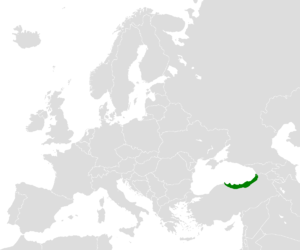
Back بنطس Arabic Pont Azerbaijani پونتوس بؤلگهسی AZB Понт Byelorussian Понт (област) Bulgarian Pontos (bro) Breton Regió del Pont Catalan Pontus Czech Pontus Welsh Pontos (region) Danish
40°36′N 38°00′E / 40.6°N 38.0°E
This article needs additional citations for verification. (August 2011) |
| Pontos (Πόντος) | |
|---|---|
| Ancient region of Anatolia | |
 Region of Pontus | |
| Location | North-eastern Anatolia (modern-day Turkey) |
| Ethnic Groups | Chalybes, Leukosyroi, Makrones, Mossynoikoi, Muški, Tibarenoi, Laz, Georgians, Armenians, Cimmerians, Pontic Greeks, Persians (from 6th c. BC), Jews, Hemshin, Chepni and Turks[1] (from 11th c.) |
| Historical capitals | Amasia (Amasya), Neocaesarea (Niksar), Sinope (Sinop), Trebizond (Trabzon) |
| Notable rulers | Mithradates Eupator |
 The modern definition of the Pontus: the area claimed for the "Republic of Pontus" after World War I, based on the extent of the six local Greek Orthodox bishoprics. | |
| Part of a series on |
| Pontic Greeks |
|---|
 |
| Pontic culture |
| Languages and dialects |
| History |
| Religion |
| Related ethnic groups |
| Persecution |
Pontus or Pontos (/ˈpɒntəs/; Greek: Πόντος, romanized: Póntos, lit. 'sea',[2]) is a region on the southern coast of the Black Sea, located in the modern-day eastern Black Sea Region of Turkey. The name was applied to the coastal region and its mountainous hinterland (rising to the Pontic Alps in the east) by the Greeks who colonized the area in the Archaic period and derived from the Greek name of the Black Sea: Εύξεινος Πόντος (Eúxinos Póntos), "Hospitable Sea",[3] or simply Pontos (ὁ Πόντος) as early as the Aeschylean Persians (472 BC) and Herodotus' Histories (circa 440 BC).
Having originally no specific name, the region east of the river Halys was spoken of as the country Ἐν Πόντῳ (En Póntō), lit. 'on the [Euxinos] Pontos', and hence it acquired the name of Pontus, which is first found in Xenophon's Anabasis (c. 370 BC). The extent of the region varied through the ages but generally extended from the borders of Colchis (modern western Georgia) until well into Paphlagonia in the west, with varying amounts of hinterland. Several states and provinces bearing the name of Pontus or variants thereof were established in the region in the Hellenistic, Roman and Byzantine periods, culminating in the late Byzantine Empire of Trebizond. Pontus is sometimes considered as the original home of the Amazons, in ancient Greek mythology and historiography (e. g. by Herodotus and Strabo).
- ^ Meeker, Michael E. (1971). "The Black Sea Turks: Some Aspects of Their Ethnic and Cultural Background". International Journal of Middle East Studies. 2 (4): 318–345. doi:10.1017/S002074380000129X. ISSN 0020-7438. JSTOR 162721. S2CID 162611158. Retrieved 28 December 2021.
- ^ πόντος, Henry George Liddell, Robert Scott, A Greek-English Lexicon, on Perseus.
- ^ Εὔξεινος, William J. Slater, Lexicon to Pindar, on Perseus.